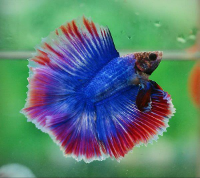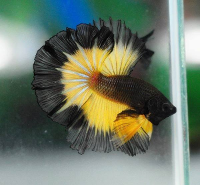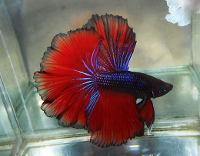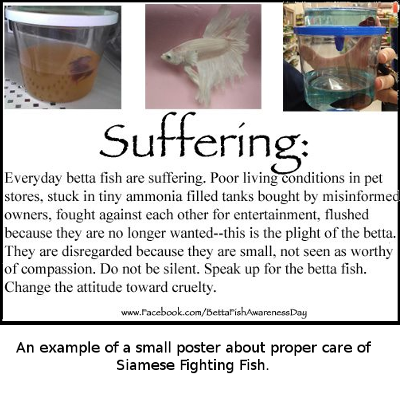Betta Homes and Gardens

 A lot of people love the Siamese Fighting Fish (Betta splendens), also called “Bettas” by people who keep them seriously. They are certainly one of the most beautiful and interesting freshwater tropical fish you can keep. Most people know that you can only keep one male Fighter in a tank because they do fight. But there is also a lot of confusion and bad information out there about the best way to keep them. Here's a list of some of the things that are sometimes said about Siamese Fighters.
A lot of people love the Siamese Fighting Fish (Betta splendens), also called “Bettas” by people who keep them seriously. They are certainly one of the most beautiful and interesting freshwater tropical fish you can keep. Most people know that you can only keep one male Fighter in a tank because they do fight. But there is also a lot of confusion and bad information out there about the best way to keep them. Here's a list of some of the things that are sometimes said about Siamese Fighters.- They come from puddles in nature and only need a jar or small fish bowl to live in;
- They don't like bigger fish tanks;
- They breath air and don't need good quality water in their fish tank;
- They eat plants, so you don't really need to feed them proper fishfood;
- They don't need tropical temperatures, so you don't need a heater;
- They will kill any other fish, so they can't be kept in a community aquarium;
- They don't need a lid on their tank or bowl;
- They only live for a year or two.
This is such a big problem (for people who care about animals) that there is now an international “Betta Fish Awareness Day” on 21 June each year and people are providing information about the proper way to look after these terrific fish on the internet. But more needs to be done!
Suggested Project
 You could design a poster or "care sheet" to tell people how Siamese Fighters should be kept. This would be something that could be sent to local aquarium and pet shops so that customers (and staff) know a bit more about about the fish and their needs.
You could design a poster or "care sheet" to tell people how Siamese Fighters should be kept. This would be something that could be sent to local aquarium and pet shops so that customers (and staff) know a bit more about about the fish and their needs.Use the internet to search for information and pictures. Here are a few sites with good information to start.
http://bettafishawarenessday.blogspot.com.au/p/faq.html
http://kb.rspca.org.au/What-sort-of-environment-should-Siamese-fighting-fish-be-kept-in_440.html
http://bettafishawarenessday.blogspot.com.au/2012/10/the-betta-fish-tank-debate.html
http://nippyfish.net/2011/10/23/the-native-betta-habitat-separating-fact-from-fiction/

But are we really sure of the "truth" about Siamese Fighters? - for discussion
Just because someone believes something and puts some information on the internet does not mean that information is necessarily "true".How can people really tell if a fish (or any any other animal) is "happy" or "suffering"? What is "cruely to animals"? How can we really measure "animal welfare"? These are important ethical and scientific issues - and not just for fish. All sorts of animals get treated in ways some people don't approve of. And people have different opinions about what is cruel or "inhumane" treatment. How would you test a statement like "Siamese Fighting Fish don't like small bowls or jars"?
If you were a scientist, you might look for evidence for and against this statement (a statement that suggests a fact is called a "hypothesis"). Are there any scientific papers on keeping Siamese Fighters in different sized aquariums? Can we look at their natural habitat and get any useful information? We could consider doing experiments to test our hypothesis but would probably have to re-word it so we have something other than "don't like" to test (it is hard to interview a fish, very few of them speak English). Maybe we can work out a definition for "healthy" or "well-being" that we could measure and reword our hypothesis to something like:
"The health and well-being of Siamese Fighting Fish kept in heated, aerated and filtered aquariums of at least 10 litres is greater than those kept in stagnant small jars at room temperature"
We could then monitor Fighters kept in different ways for health and well-being - using measures such as life-span, weight (or size) gain and how often they get diseases (and get over them).Could you design an experiment to test this hypothesis? Scientists work by trying to "disprove" the opposite of their hypothesis and using an experimental design technique called "Randomised Controlled Trials". They also do several lots of the same experiment to make sure their results are not just accidents. They use statistics to help work out what the results of their experiments actually mean. What ethical issues will you face when designing your experiment? If we really do think that Fighters suffer from being kept in jars, should we keep them that way even as part of an experiment?
Not all statements we hear about animal cruely have been tested in a scientific way.
A lot of people make judgements about what is right for animals based on their own experience with them. That's fine for them but a scientist would say that this is "anecdotal evidence" (and probably make a bit of a sneery face). What they mean is that the evidence can't be tested or repeated and its probably not even written down. We also don't really know what all the conditions were. For example, with Siamese Fighters, you will hear people say they have kept them "just fine" in a jar in their kitchen. OK, that might be true for them but how long did the Fighter live?, What was the temperature range in that person's kitchen, How often did they change the water and clean the jar? Were there plants in the jar? These are all the "variables" you would control or measure in a proper experiment.
Some people look at these sorts of issues as almost purely economic - looking at what it would cost to do what people say is the "right" thing. This is putting the welfare and convenience of humans (usually themselves) ahead of the animals'. A pet shop owner might argue, for example, that giving every Fighter a home with a filter, heater and plants would cost much more than having a shelf of jars. Sometimes they will say that the welfare arguments are not "proven" and so they should not have to pay the extra cost.
Other people make judgements about animal welfare based on their emotions. They see something happening and immediately decide whether it is "good" or "bad" based on how they feel about it. Often they will mentally put themselves in the position of the animal and react as if it was them being treated that way. This is the opposite of what a scientist would do and is called "anthopomorphism", treating animals (or other things) as if they had the same emotions and experiences as humans. You'll see "anthropomorphic" statements about Siamese Fighter care if you do some searches. Look for statements like "How would you like it if....". A variation on this way of thinking is when people take their emotional reaction or belief system and assume that everyone else "feels" the same way about something. This is called "projection".
It is important to evaluate statements about anything important. Can you tell the difference between an "evidence-based statement", someone's personal opinion based on experience, an economic response and an emotional reaction? All of these will be used in any discussion about animal welfare - on both sides of an argument. It is certainly OK to use your (and other people's experience) - and everyone will find somethings "unpleasant" or "disgusting", but how do we sort out the right way to do things, especially if we are really concerned for the animals?. How do we weigh up an animal's welfare against the costs?
A lot of issues in the "real world" come down to these types of questions and approaches. Can you identify these different types of argument in discussion of current issues? You will find examples relating animal welfare, environmental and health issues and human rights (and even issues like war and poverty) almost every day on news sites and in newspapers.
Some Other Things To Discuss (or think about)
(Warning: thinking about all these things too much will probably do your head in. Take it slowly. THERE ARE NO RIGHT ANSWERS)- What is the difference between a "hypothesis" and a "theory" (for scientists)? What do non-scientists think a "theory" is?
- When people use phrases like "It is just common sense...." or "everybody knows that..." in a debate about something, are they using science or opinion?
- If most people do think a particular thing is "true", does that make it correct?
- What is "The Precautionary Principle" and how would it apply to animal welfare questions?
- Do animals have "rights"?
- Should people always do what scientists say is the right thing? What if the scientists disagree? How else can we decide what to do?
